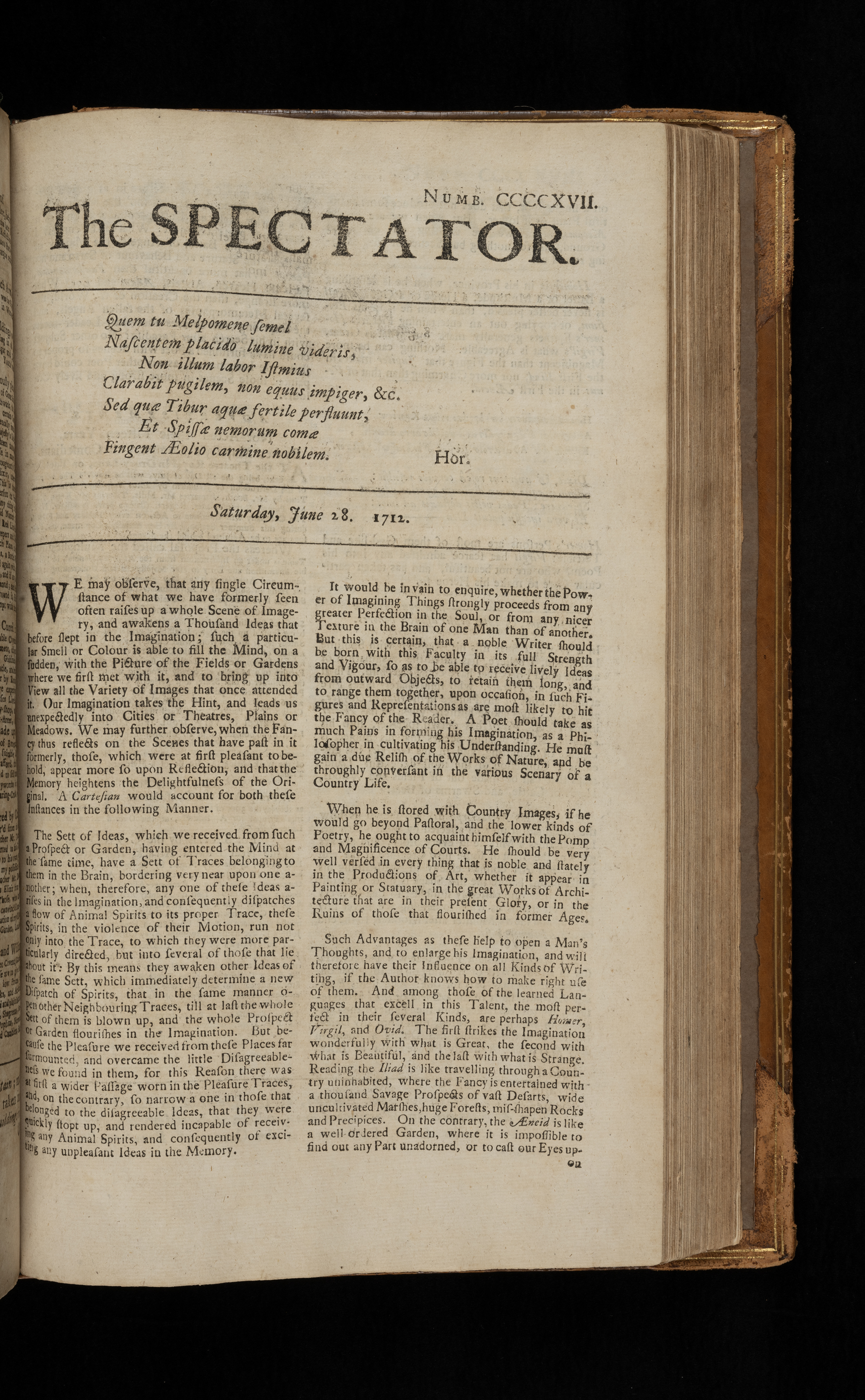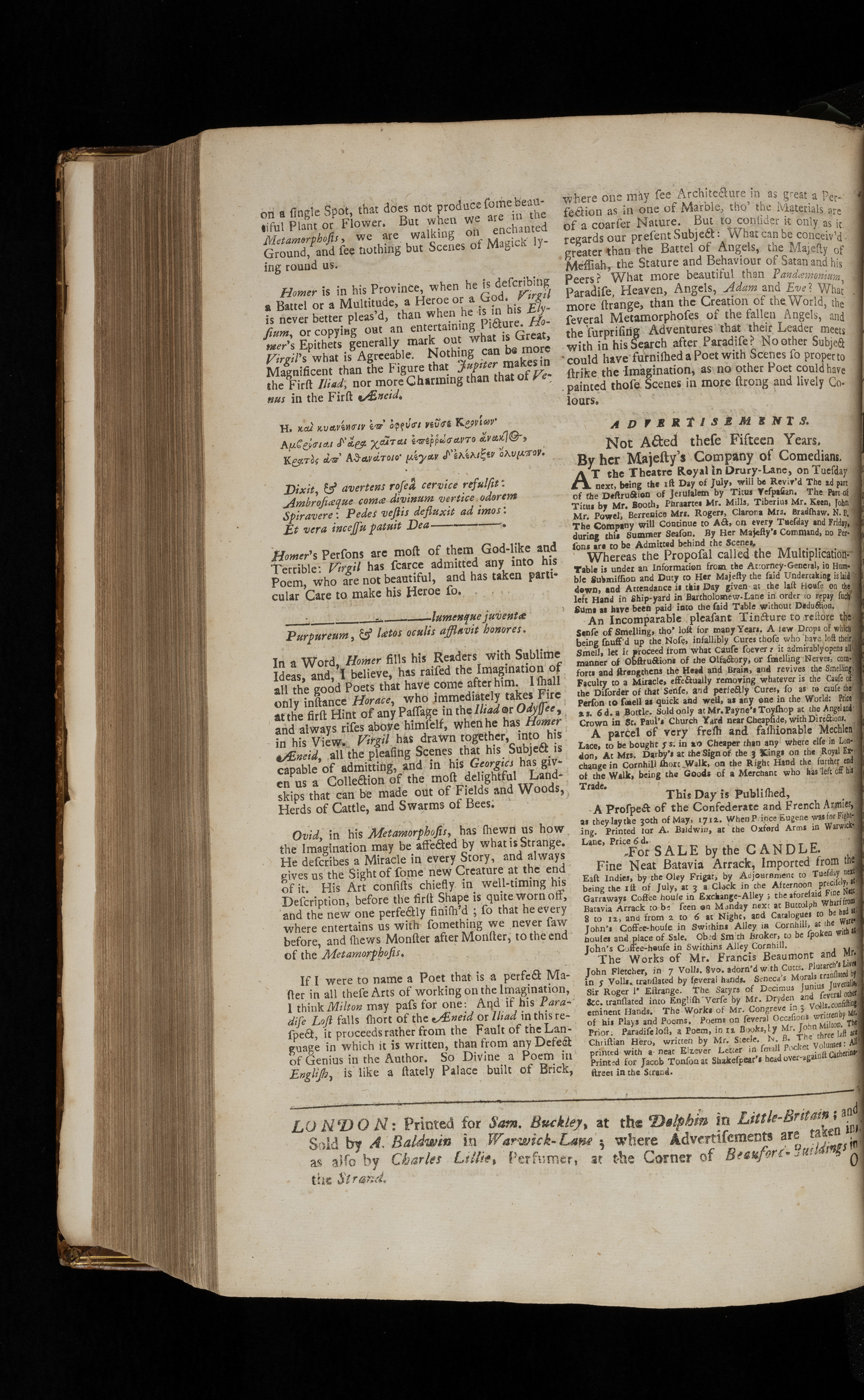The Spectator, Issue 417, Saturday, June 28, 1712
By
Joseph Addison
Quem tu Melpomene semelQuemQuem"He whom thou, Melpomene,/Hast welcomed with thy smile, in life arriving,/Never by boxer's skill shall be/Renown'd abroad, for Isthmian mastery striving;/Him shall never fiery steed draw in Achaean car a conquerer seated;/Him shall never martial deed/Show, crowned with bay, after proud king's defeated, Coimbing Capitolian steep:/But the Scool Streams that make green Tibur flourish,/And the tangled forest deep,/On soft Aeolian airs his fame shall nourish." from Ode IV.3 by the Roman poet Horace. Nascentem placido lumine videris, Non illum labor Isthmius Clarabit pugilem, non equus impiger, & Sed quæ Tibur aquæ fertile perfluunt, Et Spissæ nemorum comæ Fingent Æolio carmine nobilem. Hor.
Saturday, June 28, 1712.
We may observe, that any single Circumstance of what we have formerly seen often raises up a whole Scene of Imagery, and awakens a Thousand Ideas that before slept in the Imagination; such a particular Smell or Colour is able to fill the Mind, on a sudden, with the Picture of the Fields or Gardens, where we first met with it, and to bring up into View all the Variety of Images that once attended it. Our Imagination takes the Hint, and leads us unexpectedly into Cities or Theatres, Plains or Meadows. We may further observe, when the Fancy thus reflects on the Scenes that have past in it formerly, those which were at first pleasant to behold, appear more so upon Reflection, and that the Memory heightens the Delightfulness of the Original. A Cartesian would account for both these Instances in the following Manner.
The Sett of Ideas, which we received from such a Prospect or Garden, having entered the Mind at the same time, have a Sett of Traces belonging to them in the Brain, bordering very near upon one another; when, therefore, any one of these Ideas arises in the Imagination, and consequently dispatches a flow of Animal Spirits to its proper Trace, these Spirits, in the Violence of their Motion, run not only into the Trace, to which they were more particularly directed, but into several of those that lie about it: By this means they awaken other Ideas of the same Sett, which immediately determine a new Dispatch of Spirits, that in the same manner open other Neighbouring Traces, till at last the whole Sett of them is blown up, and the whole Prospect or Garden flourishes in the Imagination. But because the Pleasure we received from these Places far surmounted, and overcame the little Disagreeableness we found in them; for this Reason there was at first a wider Passage worn in the Pleasure Traces, and, on the contrary, so narrow a one in those which belonged to the disagreeable Ideas, that they were quickly stopt up, and rendered incapable of receiving any Animal Spirits, and consequently of exciting any unpleasant Ideas in the Memory.
It would be in vain to enquire, whether the Power of Imagining Things strongly proceeds from any greater Perfection in the Soul, or from any nicer Texture in the Brain of one Man than of another. But this is certain, that a noble Writer should be born with this Faculty in its full Strength and Vigour, so as to be able to receive lively Ideas from outward Objects, to retain them long, and to range them together, upon Occasion, in such Figures and Representations as are most likely to hit the Fancy of the Reader. A Poet should take as much Pains in forming his Imagination, as a Philosopher in cultivating his Understanding. He must gain a due Relish of the Works of Nature, and be thoroughly conversant in the various Scenary of a Country Life.
When he is stored with Country Images, if he would go beyond Pastoral, and the lower kinds of Poetry, he ought to acquaint himself with the Pomp and Magnificence of Courts. He should be very well versed in every thing that is noble and stately in the Productions of Art, whether it appear in Painting or Statuary, in the great Works of Architecture which are in their present Glory, or in the Ruins of those which2 flourished in former Ages.
Such Advantages as these help to open a Man's Thoughts, and to enlarge his Imagination, and will therefore have their Influence on all kinds of Writing, if the Author knows how to make right use of them. And among those of the learned Languages who excel in this Talent, the most perfect in their several kinds, are perhaps Homer, Virgil, and Ovid. The first strikes the Imagination wonderfully with what is Great, the second with what is Beautiful, and the last with what is Strange. Reading the Iliad is like travelling through a Country uninhabited, where the Fancy is entertained with a thousand Savage Prospects of vast Desarts, wide uncultivated Marshes, huge Forests, mis-shapen Rocks and Precipices. On the contrary, the Æneid is like a well ordered Garden, where it is impossible to find out any Part unadorned, or to cast our Eyes up- Verso on a single Spot, that does not produce some beautiful Plant or Flower. But when we are in the Metamorphoses, we are walking on enchanted Ground, and see nothing but Scenes of Magick lying round us.
Homer is in his Province, when he is describing a Battel or a Multitude, a Heroe or a God. Virgil is never better pleased, than when he is in his Elysium, or copying out an entertaining Picture. Homer's Epithets generally mark out what is Great, Virgil's what is Agreeable. Nothing can be more Magnificent than the Figure Jupiter makes in the first Iliad, no more Charming than that of Venus in the first Æneid.
ἦ καὶ κυανέῃσιν ἐπ᾽ ὀφρύσι νεῦσε Κρονίων:IliadIliadThe son of Cronos spoke, and bowed his dark brow in assent, and the ambrosial locks waved from the king's immortal head, and he made great Olympus quake." from book I of Homer's Iliad. Perseus Classical Library translation.,
Aἀμβρόσιαι δ᾽ ἄρα χαῖται ἐπερρώσαντο ἄνακτος
κρατὸς ἀπ᾽ ἀθανάτοιο: μέγαν δ᾽ ἐλέλιξεν Ὄλυμπον.
Dixit et avertens roseâ cervice refulsit:DixitDixit"She spoke, and as she turned away, her roseate neck flashed bright. From her head her ambrosial tresses breathed celestial fragrance; down to her feet fell her raiment, and in her step she was revealed a very goddess." from Book I of Virgil's Aeneid (Loeb Classical Library translation.)
Ambrosiæque comæ; divinum vertice odorem
Spiravere: Pedes vestis defluxit ad imos:
Et vera incessu patuit Dea—-------
Homer's Persons are most of them God-like and Terrible; Virgil has scarce admitted any into his Poem, who are not Beautiful, and has taken particular Care to make his Heroe so.
—---------lumenque juventælumenquelumenque"And gave his rolling eyes a sparkling grace,/And breath'd a youthful vigour on his face." from book one of the Aeneid by Virgil, translated by John Dryden.
Purpureum, et lætos oculis afflavit honores.
In a Word, Homer fills his Readers with Sublime Ideas, and, I believe, has raised the Imagination of all the good Poets that have come after him. I shall only instance Horace, who immediately takes Fire at the first Hint of any Passage in the Iliad or Odyssey, and always rises above himself, when he has Homer in his View. Virgil has drawn together, into his Æneid, all the pleasing Scenes his Subject is capable of admitting, and in his Georgics has given us a Collection of the most delightful Landskips that can be made out of Fields and Woods, Herds of Cattle, and Swarms of Bees.
Ovid, in his Metamorphoses, has shewn us how the Imagination may be affected by what is Strange. He describes a Miracle in every Story, and always gives us the Sight of some new Creature at the end of it. His Art consists chiefly in well-timing his Description, before the first Shape is quite worn off, and the new one perfectly finished; so that he every where entertains us with something we never saw before, and shews Monster after Monster, to the end of the Metamorphoses.
If I were to name a Poet that is a perfect Master in all these Arts of working on the Imagination, I think Milton may pass for one: And if his Paradise Lost falls short of the Æneid or Iliad in this respect, it proceeds rather from the Fault of the Language in which it is written, than from any Defect of Genius in the Author. So Divine a Poem in English, is like a stately Palace built of Brick, where one may see Architecture in as great a Perfection as in one of Marble, tho' the Materials are of a coarser Nature. But to consider it only as it regards our present Subject: What can be conceived greater than the Battel of Angels, the Majesty of Messiah, the Stature and Behaviour of Satan and his Peers? What more beautiful than Pandæmonium, Paradise, Heaven, Angels, Adam and Eve? What more strange, than the Creation of the World, the several Metamorphoses of the fallen Angels, and the surprising Adventures their Leader meets with in his Search after Paradise? No other Subject could have furnished a Poet with Scenes so proper to strike the Imagination, as no other Poet could have painted those Scenes in more strong and lively Colours.
O.

